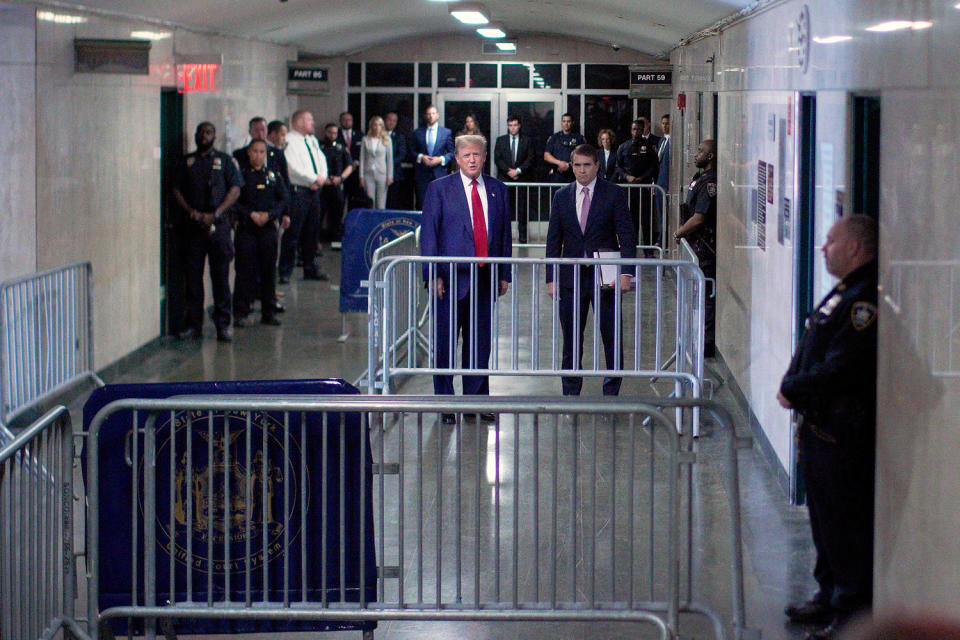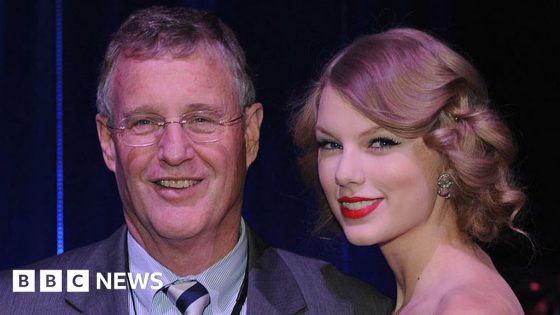In the first two weeks of his hush money criminal trial, Trump largely sat alone, without allies, in a drab Manhattan courtroom. He listened to strangers deliver stinging criticism and former friends reveal unflattering details. And he grew frustrated, convinced his supporters could be doing more to help him.
He complained that “no one is defending me,” according to a source who is familiar with some of the former president’s private conversations. He grumbled outside the courtroom that there were no protesters supporting him outside.
On Tuesday, there were signs that his allies are listening to his concerns.
Trump’s son Eric Trump joined him in court — the first time a family member had appeared with him for the trial at 100 Centre St.
Also with him for the first time Tuesday were his strategist and de facto campaign chief Susie Wiles and longtime adviser Dan Scavino. Trump’s legal strategist Boris Epshteyn was by his side two days last week. And Natalie Harp, a communications aide, has been present.
Two of Trump’s higher profile surrogates also attended court — Texas Attorney General Ken Paxton and Club for Growth Chairman David McIntosh. After the trial, Paxton spoke to the press in Trump’s defense.
Campaign staff will be mobilizing to Trump’s side, the source said, traveling more frequently to New York as he ramps up his campaigning while out of court.

Trump has complained for days that there were no protesters assembled outside the courthouse, blaming the lack of support on New York police — falsely asserting that protesters were being prohibited from gathering outside the building. (Police have set aside a designated zone across the street in a park for protesters.) On Tuesday, the largest crowd of Trump supporters yet assembled in the morning.
Trump’s lawyers have appeared to adjust his courtroom optics, too. Trump now has a stack of papers before him, which he marks up during testimony and brings out to cite during remarks to the press. When lawyers huddle with the judge at the bench, one attorney often remains at the defense table so Trump isn’t seen sitting alone — which some have said makes him look small.
Trump’s allies in Washington have stepped up their efforts by going after Manhattan District Attorney Alvin Bragg, who brought the case against Trump and who has been spotted a few feet away from the former president in the courtroom.
Bill White, a Trump fundraiser, said he had reached out to the chairs of the House Judiciary and Oversight Committees urging them to do more to show support for Trump and defend him. He said he received a polite message from Judiciary Chair Jim Jordan’s office thanking him. Soon after, Jordan, R-Ohio, in a letter to Attorney General Merrick Garland, attacked the prosecution as “politicized” and questioned the hiring of a former Justice Department prosecutor who now works for Bragg.
“The people who aren’t defending him, we’re all watching that and remembering,” White said. “Anybody that endorsed President Trump should be out there every day defending him. And he’s right to question why they’re not.”
The source said Trump had praised Jordan’s efforts in recent days.
Some of his allies also say they’re paying close attention.
Trump spokesman Steven Cheung, calling the case against the former president “partisan,” said the show of support was because of the case.
“President Trump and his allies know the truth is on their side and they will fight these hoaxes at every turn,” he said in a statement. “President Trump’s supporters and allies are out in full force, including House leadership on Tuesday, battling against partisan, illegal warfare.”
Robert Hirschhorn, a lawyer and trial consultant, said addressing the optics is important for Trump.
“Here are the choices: One is he continues to be a grumpy old man, or he can do things to diffuse the jury’s attention,” said Hirschhorn, who helped select the jury in the Robert Durst case (of HBO’s “The Jinx” fame) that ended in an acquittal. “And somebody has got the message to him.”
Hirschhorn pointed to the effect of “having Eric there,” and of Trump sitting up straight in court as ways to reframe the jury’s perception. But there’s more he could be doing, he said.
“If this guy was smart, he would have this beautiful, smart, wife in court every day,” Hirschhorn added. “The fact that she’s not there, that sends a message. You can do all that righteous indignation all day long, but you’ve got to walk the walk and talk the talk.”
Hirschhorn said the recent flurry of family and aides and allies alongside Trump could be setting up a dynamic to help bolster his defense in the face of allegations of extramarital affairs.
“Let’s see if on Thursday there’s another family member that shows up,” he said. “Because if I’m his jury consultant, I’m saying how do we convey to the jury that these people are not telling the truth: have your wife in the courtroom.”
Trump has also appeared, at times, to be sleeping in the courtroom, an optic that could work against him with the jury if some begin to believe he isn’t taking the case seriously or is wasting their time.
Giving Trump papers to read and notes to take may help offset that.
“When you have a client on trial, it’s an extraordinarily stressful experience,” said Tim Parlatore, an attorney who previously worked on Trump’s defense team in the federal election interference case. “And so you want to make sure that they are as comfortable as you can, within reason, because ultimately, the way that they’re sitting and what their demeanor is something that the jury sees.”
“Everything you’re doing, the jury is watching,” he added. “It’s smart tactics.”
Trump is facing 34 felony counts of falsifying business records related to payments that were made to adult film star Daniels during his 2016 presidential campaign. He has pleaded not guilty to all the counts.
This article was originally published on NBCNews.com
Source Agencies


